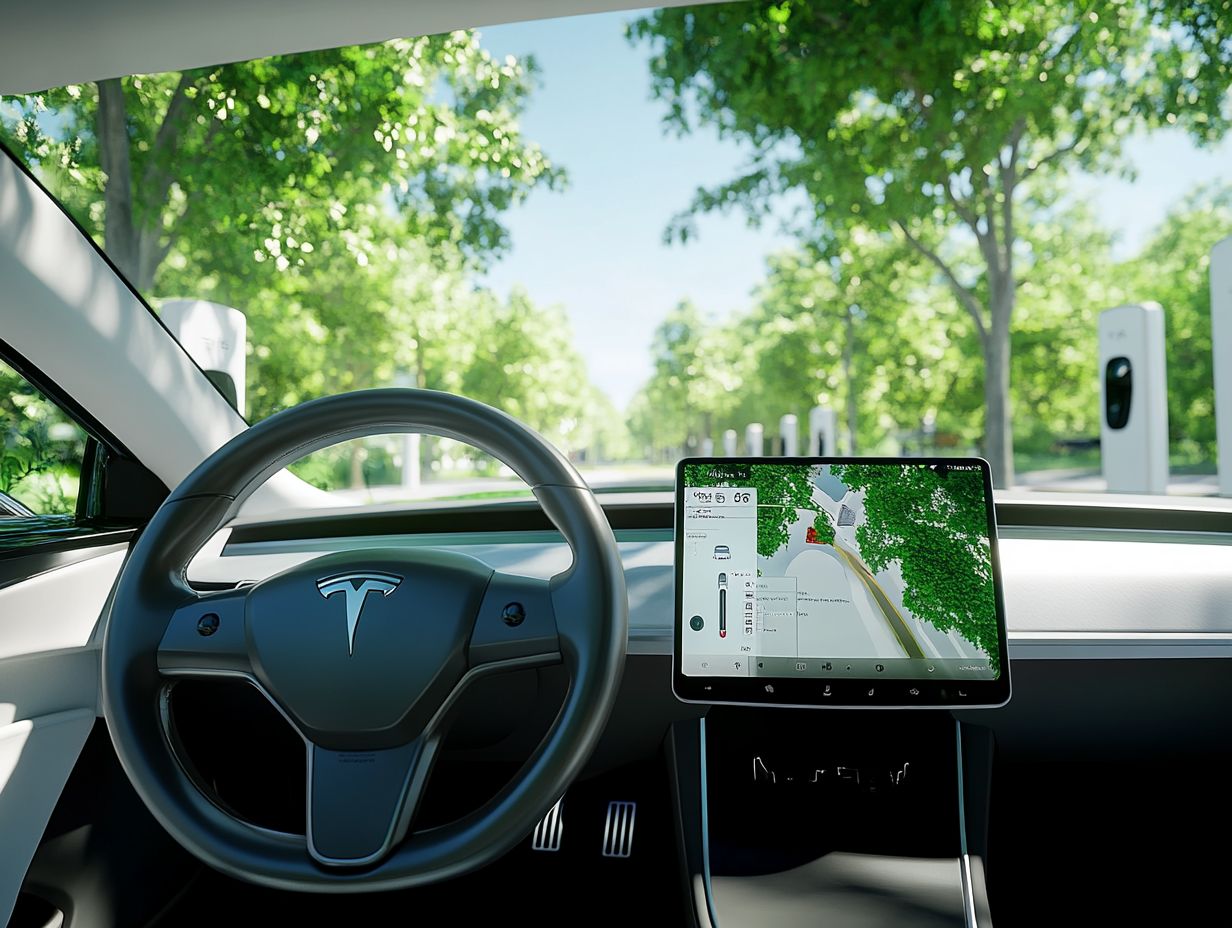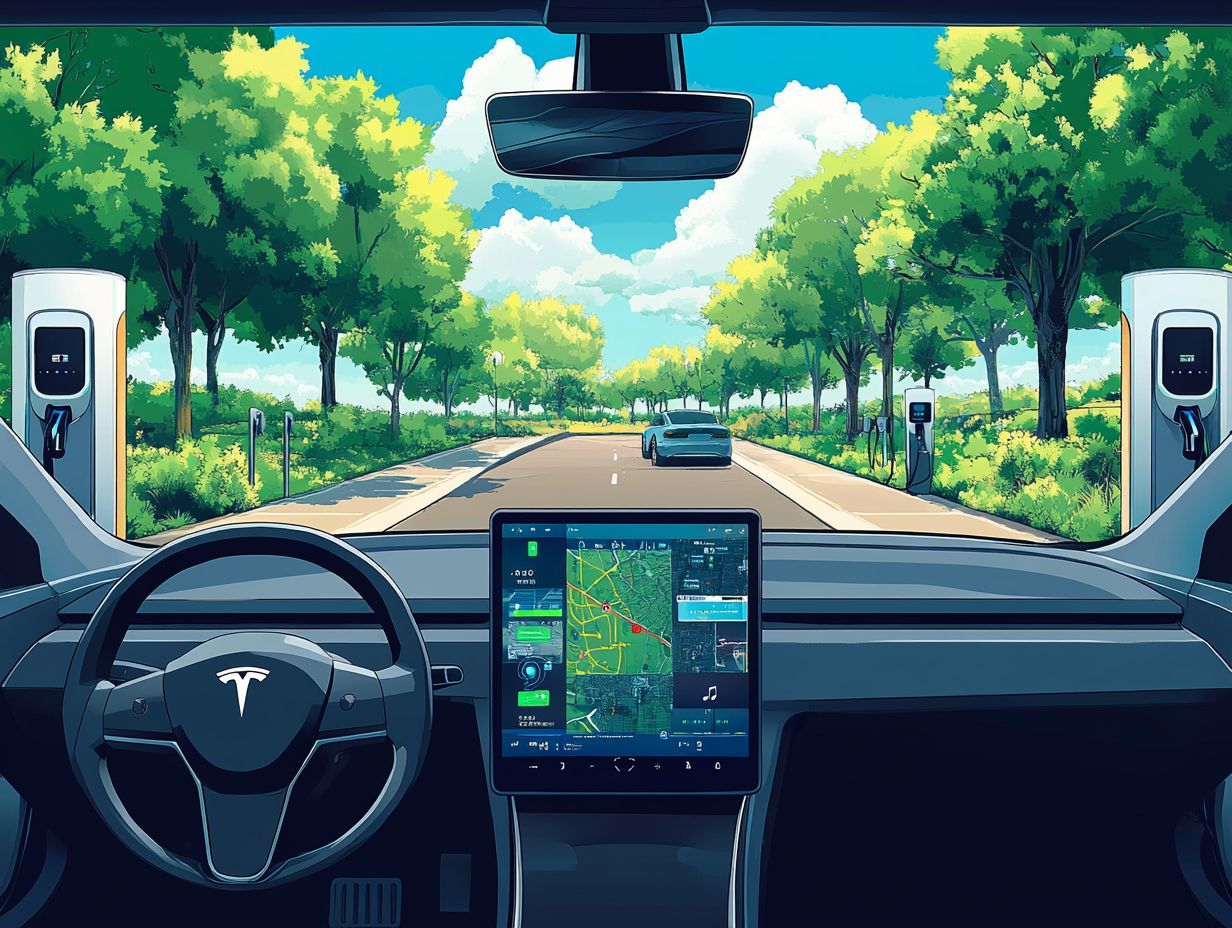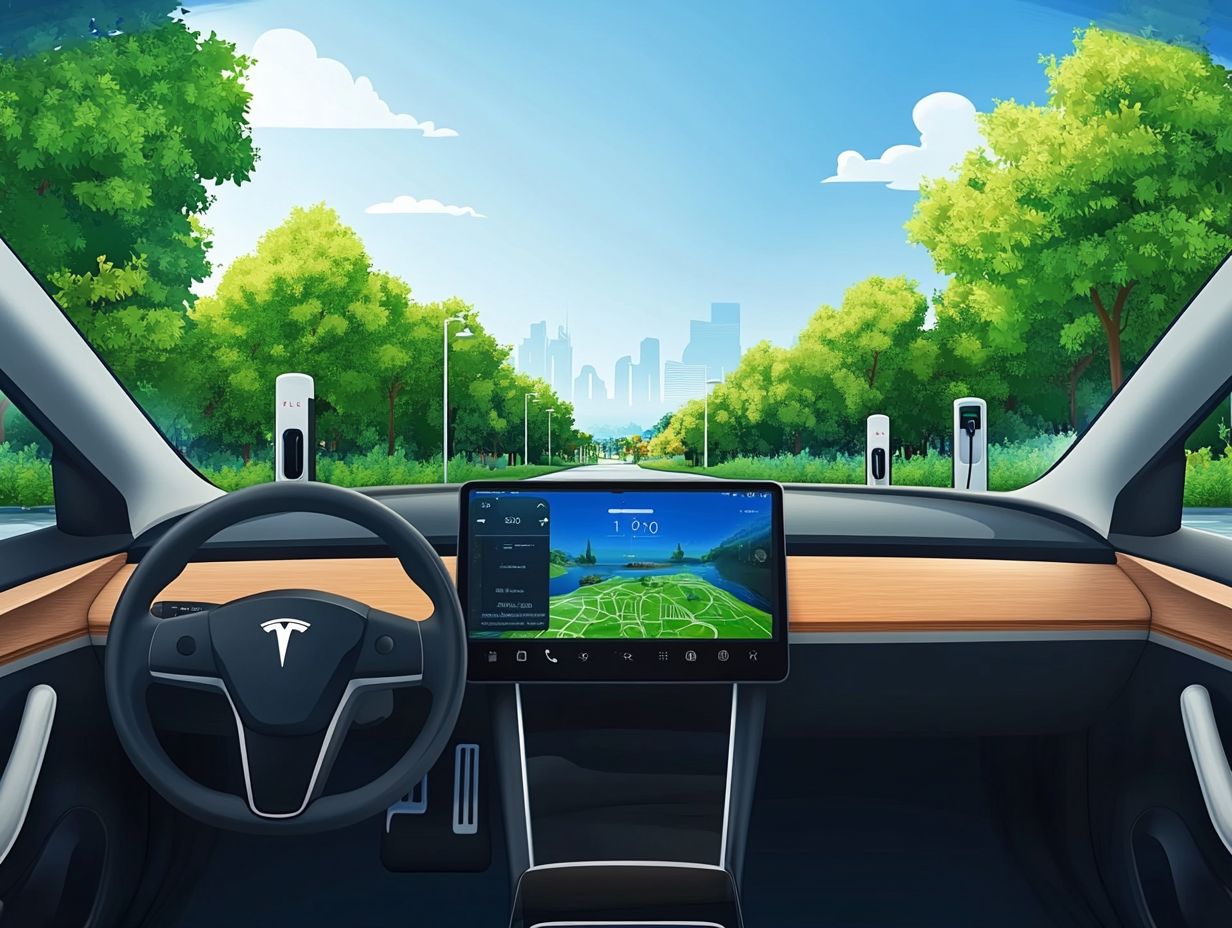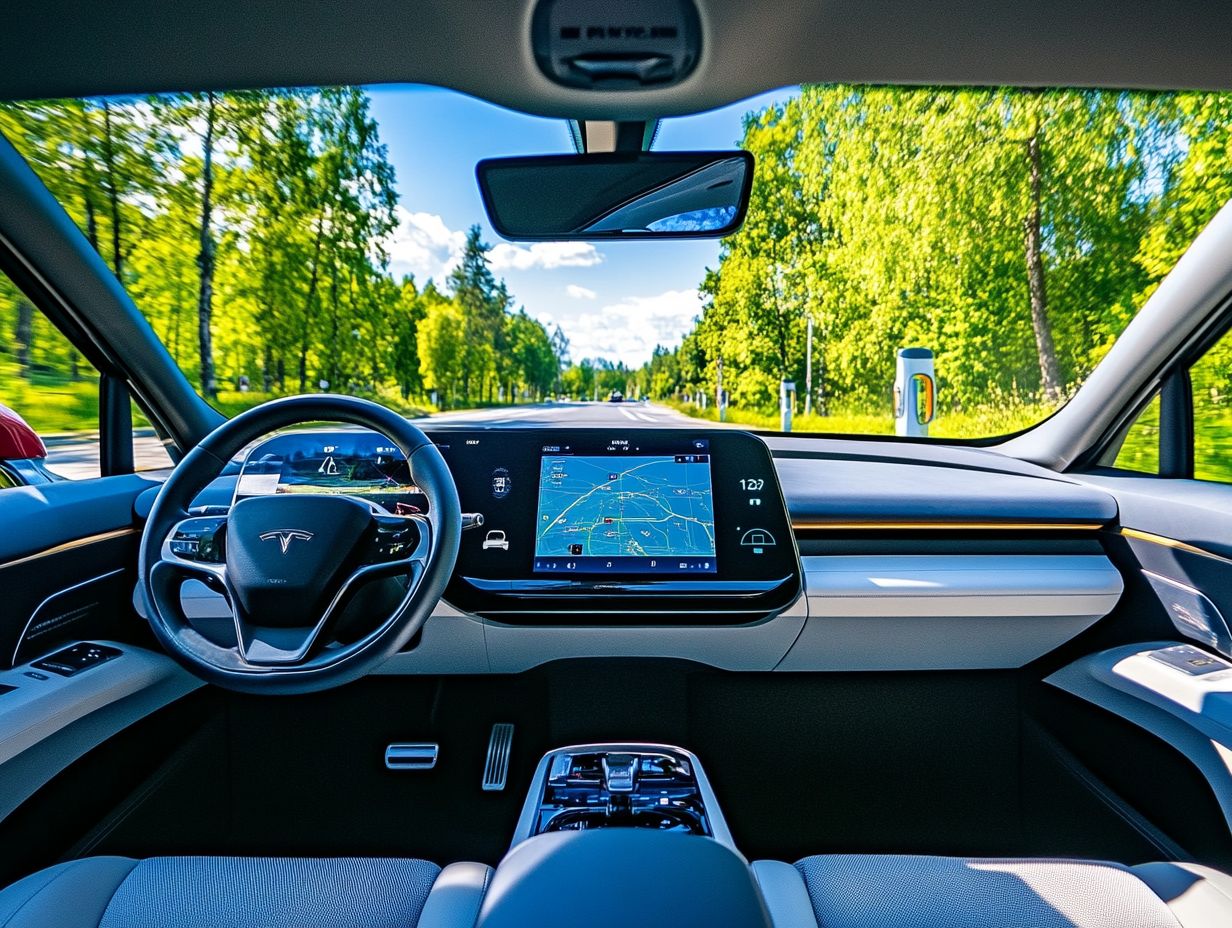5 Must-Have Features in Electric Cars
Electric cars are revolutionizing your perspective on transportation, providing an eco-friendly alternative to conventional gasoline vehicles.
This article showcases five essential features that render electric cars an enticing option:
- Impressive battery life
- Rapid charging capabilities
- Cutting-edge safety features
- Intuitive technology
- Economical maintenance
You ll also discover how electric cars stack up against their gasoline counterparts, the diverse types available, their environmental advantages, common concerns you may be wondering about, and valuable tips for making the transition.
Get ready to explore the exciting world of electric vehicles that are changing how we drive!
Contents
- Key Takeaways:
- 1. Long Battery Life
- 2. Fast Charging Capability
- 3. Advanced Safety Features
- 4. User-Friendly Technology
- 5. Cost-Effective Maintenance
- How Do Electric Cars Compare to Traditional Gasoline Cars?
- Frequently Asked Questions
- What are the top 5 must-have features in electric cars?
- How does long battery life affect the performance of an electric car?
- Why is fast charging capability important in electric cars?
- What makes efficient motors a must-have feature in electric cars?
- How do advanced safety features enhance the driving experience of an electric car?
- Why is a user-friendly infotainment system important in electric cars?
Key Takeaways:

Long Battery Life: Ensures your car can go further without needing a charge.
Fast Charging: Reduces the time spent waiting for your car to charge.
Safety Features: Keeps you and your passengers safe on the road.
1. Long Battery Life
The impressive battery life of electric vehicles is a pivotal factor that positions them as a sustainable alternative to traditional gasoline cars.
Thanks to advancements in modern battery technology, their efficiency and longevity have significantly improved, reshaping your driving experience as an eco-conscious adventurer.
In recent years, manufacturers like Tesla and Polestar have demonstrated how advanced battery packs enhance their vehicles’ range and performance, often delivering mileages that surpass previous benchmarks.
For example, Tesla s Model S offers over 370 miles on a single charge, while Polestar 2 competes with a commendable range, showcasing the remarkable evolution of battery capabilities.
This enhanced energy efficiency directly addresses the concerns of range anxiety the fear of running out of battery power before reaching your destination giving you the power to embark on longer journeys with the assurance that you won t be left stranded.
Ongoing innovations in battery technology continue to push the limits, ensuring that electric vehicles are not only an environmentally friendly choice but also a practical option for your daily needs.
2. Fast Charging Capability
Fast charging capability transforms the electric vehicle landscape, allowing you to tap into charging networks like CCS and CHAdeMO.
This not only cuts down on downtime but also enhances your overall experience compared to traditional fueling methods.
You will notice this advantage particularly as manufacturers such as Tesla, Hyundai, and Kia pour resources into developing robust fast charging infrastructure that makes life easier for drivers on the move.
While Tesla’s Supercharger network is celebrated for its extensive reach and lightning-fast charge times, Hyundai and Kia are stepping up with competitive options designed to meet the increasing demand for accessible charging solutions.
The growing availability of fast chargers encourages more drivers to embrace electric vehicles, easing range anxiety and paving the way for a more sustainable future.
As charging technology advances, the practicalities of a flexible infrastructure become ever more critical in addressing the diverse needs of consumers like you.
3. Advanced Safety Features
Advanced safety features in electric vehicles, such as collision avoidance systems and other cutting-edge driver assistance technologies, not only elevate vehicle safety but also play a significant role in reducing overall emissions by encouraging safer driving habits.
This innovative technology acts as your personal co-pilot, alerting you to potential hazards and even applying the brakes automatically when the situation demands it.
Brands like Tesla and Ford offer tailored safety packages that showcase impressive features such as lane assist and adaptive cruise control, enhancing your driving experience with both comfort and security.
By significantly reducing the chances of collisions, these advancements not only safeguard your passengers but also contribute to a lighter ecological footprint.
Fewer accidents mean fewer repairs and less demand for manufacturing replacement parts.
As more consumers embrace electric vehicles equipped with these capabilities, the cumulative impact of safer driving can lead to lower insurance premiums and improved air quality in urban areas.
Join the electric revolution and experience the future of driving today!
4. User-Friendly Technology

User-friendly technology in electric vehicles truly elevates your driving experience, thanks to smart features like advanced navigation systems and seamless connectivity. You can enjoy the convenience of over-the-air updates and real-time information at your fingertips.
These innovative advancements simplify route planning by providing real-time traffic information. They seamlessly integrate with your personal devices for a more connected lifestyle.
Over-the-air updates keep your vehicle at the cutting edge of technology, allowing you to reap the benefits of the latest safety enhancements and features all without stepping foot in a dealership.
This level of connectivity and adaptability transforms your experience on the road, making every journey not just more enjoyable but also more efficient. You re given the power to use tools that streamline your daily commutes, turning the mundane into something exceptional.
5. Cost-Effective Maintenance
One of the most compelling advantages of electric vehicles is their cost-effective maintenance. You’ll find that these vehicles typically require less upkeep compared to traditional cars, thanks to efficient battery management systems and attractive warranty options.
This reduced reliance on complex engine components translates to fewer moving parts that could wear down or require replacement, leading to significant long-term economic benefits for you. Energy optimization technologies integrated within these vehicles further lower your routine driving costs, enhancing overall efficiency and extending the lifespan of essential parts.
For example, you can say goodbye to oil changes and enjoy fewer brake replacements. Many owners discover that the total cost of ownership can be substantially less than that of gasoline-powered cars, making electric vehicles a savvy, money-saving choice for the future!
How Do Electric Cars Compare to Traditional Gasoline Cars?
Electric cars offer an enticing alternative to traditional gasoline vehicles, enhancing your driving experience while making a significant impact on the environment. With the integration of renewable energy sources into the power grid, the potential for emissions reduction becomes even more compelling.
This transition to electric vehicles elevates performance metrics, delivering instant torque and smooth acceleration transforming your time behind the wheel into an exhilarating adventure. Plus, with fewer moving parts, EVs typically demand less maintenance, making them a smart choice in the long run.
As the automotive landscape increasingly embraces electric solutions, it’s crucial to explore these benefits now, especially regarding air quality, particularly in urban areas plagued by fossil fuel emissions.
By adopting electric cars, you not only contribute to the reduction of greenhouse gas emissions but also help pave the way for a more sustainable future, encouraging innovations that bolster eco-friendly initiatives.
What Are the Different Types of Electric Cars Available?
The electric vehicle market is a vibrant landscape, featuring a diverse array of options, from fully electric powerhouses like Tesla’s flagship models to hybrids offered by brands such as Hyundai and Kia.
This variety gives you the power to choose a vehicle that aligns perfectly with your lifestyle and driving habits.
Fully electric models, such as Tesla’s Model 3 and Model Y, boast impressive ranges and rapid charging capabilities, making them ideal for those who prioritize sustainability and crave cutting-edge technology. Before making a purchase, consider these 5 tips for buying used electric cars to ensure a smart investment.
Conversely, hybrid options from Hyundai, like the Ioniq, seamlessly blend traditional gasoline engines with electric power, catering to those who might be reluctant to fully embrace electric driving just yet.
Then there are plug-in hybrids, such as the Kia Niro PHEV, which provide an excellent middle ground. They combine the best of both worlds, allowing you to rely on electric power for short trips while retaining the gasoline engine for longer journeys.
This versatility broadens the appeal across various target markets, ensuring there’s something for everyone in this evolving landscape.
What Are the Environmental Benefits of Electric Cars?

Electric cars present you with substantial environmental benefits. They significantly cut down emissions and your overall carbon footprint when powered by renewable energy.
They also champion the use of eco-friendly materials in their manufacturing processes. As society increasingly shifts towards sustainable energy sources, the potential of electric vehicles to harness solar, wind, and other green power becomes even more promising.
This transition not only alleviates the harmful pollutants typically linked to fossil fuels, but also fosters the development of a cleaner energy infrastructure.
Embracing electric cars opens the door to new ways of making cars that prioritize sustainability. This leads to reduced waste and resource consumption. This synergy creates a positive ripple effect that can enhance both the environment and public health over time.
What Are the Common Concerns About Electric Cars?
Common concerns surrounding electric vehicles often revolve around worries about battery life, the state of charging infrastructure, and uncertainties related to battery technology and maintenance costs. These factors can significantly influence your acceptance of EVs.
As you consider making the switch to electric, these issues become increasingly pertinent. Worry about battery life, frequently highlighted as a barrier, arises from the fear that your EV may not have enough battery to reach your destination without needing to recharge.
The good news is that the charging infrastructure is rapidly evolving. More public charging stations are appearing, and advancements in fast-charging technology are dramatically decreasing downtime.
Innovations in battery technology are not only extending ranges but also lowering maintenance costs through improved efficiency. These advancements improve safety features and reassure you that electric vehicles are becoming a more viable and reliable option for your daily transportation needs.
What Is the Future of Electric Cars?
The future of electric cars is looking incredibly promising for you! Advancements in intelligent infrastructure, smart energy management, and autonomous driving technologies are poised to redefine the automotive landscape and elevate your overall driving experience.
As these innovations unfold, you can expect enhanced automation to lead to more efficient routes and optimized energy consumption, significantly reducing both your travel time and carbon footprint.
Imagine a world where electric cars make your life easier! Picture electric vehicles communicating seamlessly with each other to avoid congestion while also linking up with charging stations to minimize downtime.
This synergy creates a remarkably smooth experience, allowing you to focus on enjoying the journey rather than stressing over logistics. The move towards using sustainable materials in car manufacturing aligns perfectly with eco-friendly practices, opening the door to greener transportation options that resonate with your environmentally conscious values.
How Can One Transition to an Electric Car?
Transitioning to an electric car requires you to understand various charging options, explore smart home integration possibilities, and familiarize yourself with driving modes and warranty options to ensure a seamless switch.
It s vital to research local charging stations, including both availability and types of chargers, as well as home charging solutions that align with your lifestyle whether that means opting for a fast charger or a more standard installation.
Integrating smart home technologies can significantly enhance your charging experience, allowing you to schedule charging during off-peak hours or monitor battery status right from your smartphone.
As you navigate this transition, considering the total cost of ownership which includes the price of the car, insurance, and any charging fees will deepen your understanding of the benefits.
With these elements in mind, you can make informed decisions that truly align with your daily needs and preferences.
Frequently Asked Questions

What are the top 5 must-have features in electric cars?
Electric cars are becoming increasingly popular. Here are the top 5 features you should look for:
- 1. Long Battery Life
- 2. Fast Charging Capability
- 3. Efficient Motors
- 4. Advanced Safety Features
- 5. User-Friendly Infotainment System
These features are essential for a smooth and convenient driving experience.
How does long battery life affect the performance of an electric car?
Long battery life is crucial because it affects the driving range. With a longer battery life, you can travel further on a single charge.
This efficiency also reduces the overall cost of ownership.
Why is fast charging capability important in electric cars?
Fast charging is vital for those who travel long distances. You can charge your car to 80% in just minutes, minimizing downtime during trips.
This feature is also a lifesaver in emergencies when you need a quick boost.
What makes efficient motors a must-have feature in electric cars?
Efficient motors enhance the car’s performance, including acceleration and top speed. The more efficient the motor, the quicker the car responds.
These motors also conserve energy, allowing for a longer driving range.
How do advanced safety features enhance the driving experience of an electric car?
Advanced safety features like collision avoidance and lane departure warning make driving safer. They provide protection for all passengers and create a more enjoyable driving experience.
Why is a user-friendly infotainment system important in electric cars?
A user-friendly infotainment system allows easy control of the car’s features. You can check the battery level, monitor energy usage, and find charging stations effortlessly.
This system also enhances your journey with entertainment options like music and navigation.






